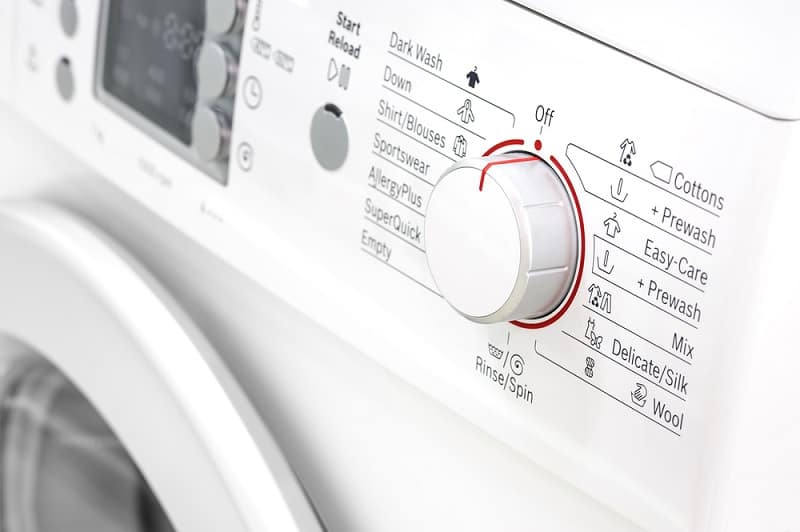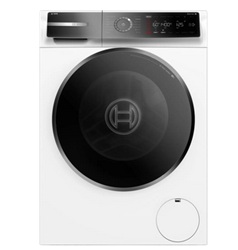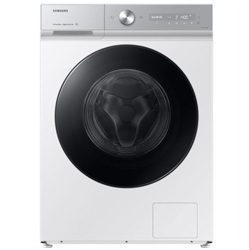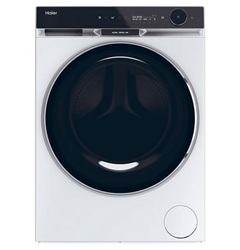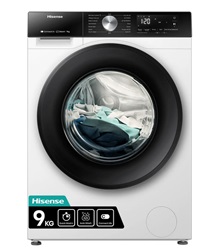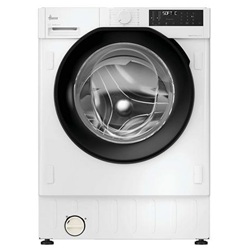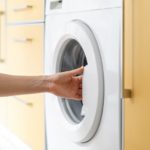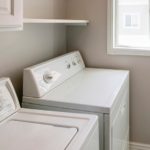In the past few years, energy prices in the UK have hit record highs, and lots of people are looking for ways to keep their energy bills to a minimum. One way to do this is to choose more energy-efficient appliances.
Thankfully, the technology used in washing machines is advancing, helping them get your clothes just as clean as before but without using so much electricity. Most washers on the markets these days are A-rated for energy usage. However, within this energy efficiency rating there is quite a lot of variation,and some models are significantly more efficient than others.
We’ve researched the market to find the most energy-efficient washing machines on the market in the UK. To do this, we looked at the energy usage per cycle cited on retailer websites like AO.com and Currys.co.uk. The cost per cycle figure is based on the assumption that your electricity costs 26.35p per kWh, which is the average for the Energy Price Cap period from 1 October to 31 December 2025.
The Most Energy Efficient Washing Machines in the UK
1. Bosch Series 8 i-Dos WGB256A2GB
Energy usage per cycle: 0.3 kWh
Energy cost per cycle: £0.08
Energy rating: A
Capacity: 10 kg
Installation type: Freestanding
This sleek and modern-looking washing machine from German brand Bosch has a generous 10 kg capacity that should be big enough for busy families. With an energy usage of just 0.3 kWh per cycle, it’s the most efficient washer we could find on the UK market at the time of writing.
Bosch’s i-DOS technology can help you save money on detergent as well, since you just top it up with detergent and then it works out exactly how much to use each time.
While the most energy-efficient cycles are quite slow, you can use the SpeedPerfect feature to make a cycle up to 65% faster when you’re in a hurry. There’s also a handy 30-minute quick wash programme for quickly refreshing clothes.
If noisy washing machines bother you, you’ll be happy to hear that this machine has an anti-vibration design to stop it shaking and moving around too much, and the drum uses frictionless magnets to reduce noise as much as possible.
This washing machine is expensive, but it’s very well built and should last many years. It comes with the smart features you’d expect in this price range, including the ability to monitor and control the machine via an app.
2. Samsung Series 8 AI Energy ecobubble™ WW11DB8B95GHU1
Energy usage per cycle: 0.32 kWh
Energy cost per cycle: £0.08
Energy rating: A
Capacity: 11 kg
Installation type: Freestanding
While it’s not exactly cheap, this washing machine from Samsung is one of the more affordable ultra-efficient options available.
It offers a big 11 kg drum, helping you keep the number of loads you need to do each week to a minimum. Despite having such a large drum, the machine itself is the standard size, so it will fit in a standard washing machine gap.
Samsung boast that the machine uses AI technology to analyse your washing load and adjust the settings automatically to keep energy usage to a minimum.
Another clever design feature is Samsung’s ecobubble™ technology, which mixes water, detergent and air to creates soapy bubble that help get clothes clean at lower temperatures.
There’s also an app you can use to check on the status of your washing while you’re in another part of the house.
3. Haier X Series 11 HW110-BD14397U1
Energy usage per cycle: 0.32 kWh
Energy cost per cycle: £0.08
Energy rating: A
Capacity: 11 kg
Installation type: Freestanding
The Haier X Series 11 HW110-BD14397U1 has a large 11 kg capacity, so it could be a good choice for larger families and households. It’s cleverly designed with some innovative features such as Ultra Fresh Air, which keeps your laundry smelling fresh if you’re unable to take it out of the drum immediately by circulating fresh air through the drum for up to 12 hours.
This washing machine uses auto dosing to automatically add the right amount of detergent to washes, so you won’t need to worry about under- or overdoing it with the laundry detergent.
There’s also the option to control the machine via Haier’s hOn app, which a lot of users find convenient. Another nice thing is that the Direct Motion Motor helps keep the spin cycle relatively quiet at 70 dB.
4. Hisense 3S Series WF3S9043BW3
Energy usage per cycle: 0.34 kWh
Energy cost per cycle: £0.08
Energy rating: A-30%
Capacity: 8 kg
This reasonably priced washing machine from Chinese brand Hisense uses an incredible 0.34 kWh of energy per cycle, which should only cost you around 8p at current energy prices.
The machine has an A-30% rating, which means it uses 30% less energy than an A-rated machine.
According to Youreko, this machine could save you £492 in energy bills over the course of its lifetime (based on current energy prices). Since it costs less than £492 to buy, it should more than pay for itself over its lifetime.
What can it do besides save you money? Well, it has 16 programmes including special cycles for wool, allergy care, and a quick wash cycle with a choice of lengths (15, 30 and 49 minutes).
It also has some smart features: You can manage the machine and keep track of energy usage by connecting it to an app on your phone.
The 9 kg drum should be big enough for families, and the spin cycle is relatively quiet, producing 72 decibels of noise.
There isn’t much to complain about with this machine. It comes with a two-year warranty, but hopefully it should last much longer so you keep benefitting from those energy savings.
5. Hoover H-WASH 400 BH4S69M6D9J-80
Energy usage per cycle: 0.35 kWh
Energy cost per cycle: £0.09
Energy rating: A
Capacity: 9 kg
Installation type: Integrated
If you’re looking for a very energy efficient integrated washing machine that can be built into your kitchen cupboards, the Hoover H-WASH 400 BH4S69M6D9J-80 is a great option. It has a decent 9 kg capacity and uses just 0.35 kWh of energy per cycle thanks to the Speed Drive Inverter motor.
You can control it and check on its progress via WiFi using the hOn app, and also schedule a wash in advance to take advantage of off-peak energy costs.
There’s a good selection of washing programmes including options for woollens and handwash items as well as a 14-minute quick wash cycle for washing up to 1.5 kg of laundry and a 59-minute quick wash cycle for a full load.
Do Washing Machines Use a Lot of Electricity Compared to Other Appliances?
The exact amount of energy an appliance will use over the course of a year will depend on not only the type of appliance, but the energy rating, how much power it uses and how often you use it.
For most people, running a washing machine will cost less in electricity bills than running a tumble dryer, dishwasher or oven.
Average washing machine energy usage
Based on an A-rated washing machine, you can expect to use 130 kWh of electricity over the course of 220 cycles. This works out to an annual cost of £31.85, and a cost per cycle of just 14p.
Average tumble dryer energy usage
Exactly how much a tumble dryer will cost to run will depend on the type of dryer that you are using. The types of tumble dryer are condenser, vented and heat pump.
Condenser
The average condenser tumble dryer uses 4.8 kWh of electricity to run a full-load cotton cycle. This would cost £1.18 per cycle.
Vented
The average vented tumble dryer uses roughly 5 kWh to run a cotton cycle with a full load. This would cost £1.23.
Heat pump
By comparison, the average heat pump tumble dryer uses just 1.87 kWh for a full-load cotton cycle, costing £0.46 at current prices.
Average dishwasher energy usage
A typical dishwasher with a C energy rating uses approximately 0.75 kWh of energy per cycle, totalling 161.25 kWh of electricity over the course of a year (average of 215 cycles per year). This totals an annual energy cost of £54.83, and an average cost of 26 pence per cycle.
Average oven energy usage
The running cost of an oven will depend on the fuel source it uses, the size, and a whole host of other factors. Based on an A-rated electric oven, you can expect to use around 0.79 kWh per hour, which works out to be around 27 pence.
Over the course of a year, your oven could easily use 328 kWh of electricity (based on eight hours of usage a week), totalling £111.52.
How to Choose an Energy-Efficient Washing Machine
Choosing a new washing machine with the aim of saving money on your energy bills doesn’t need to be a complicated process. You can make a good choice by carefully checking the appliance’s energy label, the drum size, and the spin speed.
Energy rating
Checking the energy efficiency label is a sure-fire way to quickly compare how energy efficient a washing machine is compared to its competitors. The system changed in March 2021 and got rid of all the pluses, opting instead for a simpler G (least efficient) through to A (most efficient) rating system.
A washing machine with an A rating will use much less energy than a comparable washing machine of the same size and with similar specifications that has a D rating.
Size
When it comes to choosing a new machine, it is crucial that you seriously consider the size of the drum.
If you purchase an 11 kg washing machine but typically only wash 7 kg loads and can’t reasonably fill an 11 kg machine, this will end up costing you more in the long run.
Most small households will be absolutely fine with a washing machine with a drum smaller than 6 kg, medium households will benefit from a 7 to 9 kg drum, and larger households should look at 10 kg and over.
Spin speed
When it comes to drying clothing, choosing a washing machine with a higher spin speed can save you money. As this will drain more of the water out of the laundry, it will not cost you as much to dry the clothes in a tumble dryer after.
What’s the Difference Between A and B Energy Ratings on a Washing Machine?
The energy rating scale runs from A to G, with A being the most efficient, and G being the least efficient. This means that in short, a washing machine with an A energy rating is more efficient than a comparable washing machine with a B energy rating.
How is a washing machine’s energy rating calculated?
As different types of appliances work differently, the method for calculating an energy rating will vary. For washing machines, this is calculated as being the amount of energy that the machine would use, in kilowatt hours, across 100 cycles.
The energy usage is calculated on energy consumption during what is known as an Eco 40-60 Wash. This wash cycle is the most efficient in terms of water and energy usage, and is perfect for cleaning regularly soiled fabrics like linen, cotton or mixed fibres.
Running costs
The average A rated 9 kg washing machine will use about 0.59 kWh of electricity per cycle. By comparison, the average B rated 9 kg washing machine will use around 0.89 kWh of electricity per cycle.
Based on the current average electricity price of 24.5p per kWh, this works out that an A rated machine would cost you 14p per cycle, and the B rated washing machine would cost you 22p per cycle.
Over the course of a year, most households will use the washing machine approximately 220 times, which works out as an average of four or five times a week.
In a year, the A rated machine would cost £31.80 to run, and a B rated machine would cost about £47.97 to run, meaning the A rated machine could save you £16.17 a year on your energy bills.
How to Save Energy When Using Your Washing Machine
Whilst the energy efficiency label and figures will give you a pretty good indication of how much a new washing machine will cost, there are always steps that you can take to boost the efficiency of an appliance in normal use.
1. Choose shorter cycles where possible
Where possible, try to use shorter wash cycles. This one is especially helpful if you are on a water meter, and this is a great way to reduce the amount of water that your washing machine is using in the average cycle.
2. Wash at lower temperatures
Stick to cooler temperatures when washing clothing or fabrics that are only lightly soiled. Where possible, try to only use higher temperatures when you are washing articles that are particularly dirty or stained.
Make sure that you do run a higher temperature wash cycle every now and again though, as this will stop bacteria and nasty smells building up in your washing machine.
3. Use the right load size
Instead of running multiple small washing machine cycles, try to gather up a full load of washing instead, but don’t overfill the machine. This will bring great savings to both your electricity and water usage.
4. Use stain remover
Stubborn stains can sometimes require multiple washing machine cycles to shift but investing in a good stain remover can stop this from being a necessity. Apply a good stain remover before putting the clothing through the wash, and then you can run the cycle on your normal setting, rather than turning the temperature up or re-running the wash.
5. Soak before you wash
If a stain remover isn’t an option, soak heavily soiled items before putting them in the washing machine. Rub at the stains with household soap so you don’t have to rerun a wash.
6. Use high spin speeds to cut tumble dryer usage
Where you can, use a high spin speed. This will mean that your clothing comes out of the washing machine almost dry, and therefore won’t need the greatest amount of time in a tumble dryer. Be aware, however, that this is not to be recommended for truly delicate items of clothing.
7. Use off-peak hours (depending on your tariff)
Check your energy tariff – some suppliers and plans have off-peak hours, during which energy prices are cheaper. If you can, try to run your washing machine cycles during these hours to save on the energy costs!
Conclusion
Hopefully you now have more of an idea about which energy-efficient washing machine will suit your lifestyle, pocket and household the best.
The most energy-efficicent washing machine we could find is the Bosch Series 8 i-Dos WGB256A2GB with an energy usage per cycle of just 0.3 kWh. This would cost about 8p per cycle at current prices of 26.35p per kWh.
Reducing the energy consumption of your washing machine is not only good to save you money on bills, but it’s great for reducing the environmental impact of excessive energy usage. Have fun saving money with your new washing machine!

In The Wash is your guide to the best laundry and cleaning products, tips and tricks. Our mission is to solve the UK’s cleaning and laundry dilemmas!
